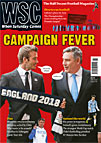 Tony Mowbray promised attacking football but lasted only nine months at Celtic Park. Neil Forsyth looks at what went wrong
Tony Mowbray promised attacking football but lasted only nine months at Celtic Park. Neil Forsyth looks at what went wrong
The car park outside Celtic Park is an influential stretch of concrete. Prominent new arrivals, such as Robbie Keane, are sent out there to receive adoration, while protests in the car park have been synonymous with much of Celtic’s recent history. They brought down the board in 1994, before Fergus McCann arrived to build a new Parkhead and start the process of correcting the club’s finances.
When Tony Mowbray stepped off Celtic’s team bus late at night on March 23 after being thumped 4-0 at nearby St Mirren, he was greeted by a small band of angry fans and a banner reading Mowbray Out that had been impressively generated in the hours after the game. The banner owner’s household may have ended the night one bed sheet down but the wish was granted with Mowbray being sacked the next day.
It wasn’t just the banner. Mowbray’s nine-month reign at Celtic started unconvincingly then descended into a curiously depressing experience for all involved. Rangers pushed clear at the top of the SPL and even a (seemingly) impending Scottish Cup final couldn’t save Mowbray after the St Mirren result. In a league which has long been a duopoly, either half of the Old Firm owe any success to the comparative strength of the other. In every area other than the league table, Rangers are in an awful state. Hugely in debt, a management team operating without contracts, no buyer after virtually three years on the market and a playing budget that has been steadily reduced, they should have been there for the taking by a financially sound Celtic.
Rangers were a problem, but then again they always are. The second issue with Mowbray’s Celtic was unique, self-generated and rooted in his appointment itself. Mowbray being given the job owed something to his status as a former Celtic captain and to the successful elements of his time at Hibs and West Brom. But it was the image of Mowbray as a proponent and dedicated loyalist to footballing purity that won him the gig. At Hibs he provided various mantras concerning attacking football, some of which were draped in advertising hoardings from the stadium. At West Brom, the fans granted Mowbray a standing ovation at the season’s end even when his expansive football had been a factor in their relegation.
This was a Celtic man who would have the team not just winning but also thrilling. Martin O’Neill, revered though he rightly is, produced teams of stoic workers while O’Neill’s successor Gordon Strachan valued industry above all else (epitomised in his tricky relationship with winger Aiden McGeady). Mowbray promised something new. When that didn’t arrive matters took an unfortunate turn.
At Hibs he was rarely rattled by circumstance and when he spoke of his strongly held belief in a passing game it was offered only as a positive view on how the sport should be played. At Celtic it mutated into some strange defence mechanism. Mowbray indulged in a faintly ludicrous phoney war with Rangers, throwing in references to a private conversation he’d had with Rangers manager Walter Smith where Smith had apparently advocated a more defensive approach than Mowbray’s outlook. “Maybe it is a league for playing defensive, negative football,” said Mowbray on another occasion in reference to Rangers’ success. All this came while his team were dropping away in second.
It was a diversion ploy that was hard to buy and became in itself a damning indictment of Mowbray’s management. The fact that Celtic ended the St Mirren match with “six strikers” wasn’t a testament to total football, more total desperation. For months Mowbray had made it abundantly clear that he wasn’t actually enjoying the experience of managing Celtic. In November he clarified that he didn’t like being a football manager and in January he told a press conference: “This job is not a job I enjoy. Do I have fun? No. I come to work, I work as hard as I can and I don’t cut corners.”
Comments like this are hardly Churchillian and struck a dismaying air that seemed to permeate the club. In the end the board had little choice but to act. Despite his foibles, Mowbray comes across as intelligent and decent yet there’s no escape from concluding he contrived to blow one of the best opportunities a new Celtic manager has been given for a long time.
From WSC 279 May 2010